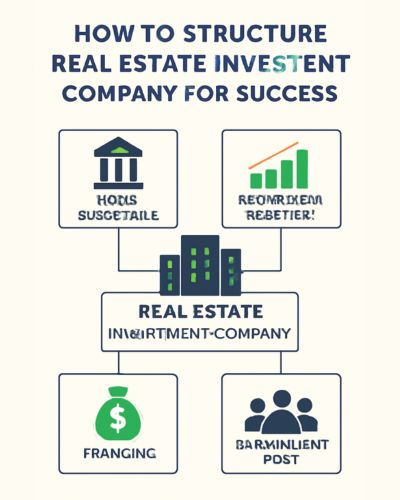structure real estate investment company is more than buying properties. It’s about creating a money-making machine. If you get the structure wrong, you could lose money. You might also face legal issues or see your deals fall apart before closing. Nail it, and you’ll sleep easy. Your investments will protect you, scale well, and last. Whether you’re a rookie or a seasoned player, how you set up your business can make or break your success.
I’ve seen too many investors jump in without a plan, only to face nasty tax surprises or partnership blowups. Early in my career, I watched a friend lose six figures because he mixed personal and business assets. That mistake taught me the hard way: structure isn’t paperwork—it’s your first line of defense. After 12 years in this game, I’ve learned that the right setup is not about fancy words. It’s about making smart, practical choices.
This post will walk you through the must-know steps to structure your company the right way. You’ll learn how to shield your personal assets, slash taxes, and set up a system that grows with your portfolio. We’ll discuss LLCs and corporations. We’ll also look at why your brother shouldn’t be your business partner. Finally, we’ll share tips to help new investors avoid common pitfalls. By the end, you’ll have a clear roadmap—no law degree required.
how to structure real estate investment company
structure real estate investment company is more than just buying properties. You need a solid base. It should protect your assets, increase profits, and support growth. The right structure can lead to smooth growth or costly legal issues. No matter if you invest alone or with partners, here’s how to set up your company right.
1. Choose the Right Business Entity
The first step is deciding on a legal structure. An LLC, or Limited Liability Company, is a top choice for real estate investors. It provides liability protection and tax flexibility. If you plan to raise capital or go public someday, a C-Corp might make sense—but it comes with double taxation. S-Corps can work for smaller operations, but they have ownership restrictions. Every structure has its pros and cons. So, talk to a tax expert before you make your choice.
2. Separate Personal and Business Assets
Mixing personal and business finances is a recipe for disaster. Open a business bank account. Also, get a separate EIN (Employer Identification Number) for taxes. Don’t use personal credit cards for property expenses. This can blur legal lines and may risk your home or savings if you face a lawsuit. Holding properties in separate LLCs (one for each asset) adds protection. This setup keeps each investment safe from liabilities linked to others.
3. Define Ownership and Roles Clearly
If you have partners, clearly outline everything in an operating agreement. Include who invests money, who handles daily operations, and how profits are divided. Vague handshake deals lead to messy disputes. Even if you’re alone, write down your decision-making steps. This helps future hires or investors. Clarity now prevents headaches later.
4. Set Up Smart Tax Strategies
Real estate has special tax benefits, but you must set things up right to enjoy them. Depreciation, 1031 exchanges, and pass-through deductions can save thousands. Work with a CPA who specializes in real estate to ensure you’re not overpaying. Some investors choose Delaware or Wyoming LLCs for tax benefits. But, local rules vary, so don’t think there’s a one-size-fits-all solution.
5. Plan for Growth from the Start
Your structure should allow for scaling without constant legal overhauls. Think about future funding needs—will you bring in private investors? Secure bank loans? A good operating agreement and clear financial records help attract capital. Also, consider property management early. Will you handle it yourself, or hire a third party? The right systems today prevent chaos tomorrow.
The best real estate investors don’t just chase deals they build durable companies. Skipping these steps might save time upfront, but it’ll cost you later. Get the structure right, and you’ll invest with confidence, knowing your business is built to last.
What Are the Pros and Cons of an LLC vs. a Corporation for Real Estate Investors?
An LLC provides flexibility and pass-through taxation. This means profits and losses go to the owners’ personal taxes. It also offers strong asset protection. But, raising capital can be harder. A corporation (C-Corp or S-Corp) makes it easier to invest through shares. This structure works well for larger portfolios. But, it does face double taxation, meaning both corporate and shareholder taxes apply. Most real estate investors prefer LLCs for their simplicity and tax advantages.
How Can You Structure a Real Estate Business for the Greatest Tax Efficiency?
Choose a pass-through entity like an LLC or S-Corp to avoid double taxation. Deduct expenses like property depreciation, mortgage interest, and maintenance costs. Use a 1031 exchange to defer taxes when reinvesting profits into new properties. Work with a tax advisor to align your structure with federal and state laws.
What Legal Frameworks Offer the Best Asset Protection for Real Estate Portfolios?
LLCs are the gold standard—they shield personal assets from business liabilities. For added protection, hold properties in separate LLCs (one per asset) to isolate risks. Trusts or land trusts can also anonymize ownership and reduce exposure to lawsuits.
What Are the Requirements to Set Up a Real Estate Investment Trust (REIT)?
To qualify as a REIT, your company must:
- Invest 75% of assets in real estate.
- Derive 75% of income from property rents or sales.
- Distribute 90% of taxable income to shareholders.
- Have at least 100 shareholders. The IRS and SEC regulate REITs, so legal compliance is critical.
How Should Investors and Partners Distribute Equity and Profits?
Define equity splits upfront in your operating agreement. Common models include:
- Waterfall distributions: Rank returns to certain investors before others.
- Proportional splits: Dividends align with ownership percentages.
- Preferred returns: Guarantee a fixed return (e.g., 8%) to passive investors first.
Essential Clauses in a Real Estate Joint Venture or Syndication Agreement
Key clauses include:
- Profit-sharing terms (e.g., 70/30 split after preferred returns).
- Roles and responsibilities (who handles management, financing, etc.).
- Dispute resolution (mediation or arbitration processes).
- Exit strategies (how to sell assets or dissolve the partnership).
How Do You Design an Organizational Hierarchy for Efficient Property Management?
Start with core roles:
- Managing Member/CEO: Oversees strategy and investor relations.
- Acquisitions Team: Sources and vets properties.
- Asset Manager: Monitors property performance.
- Property Manager: Handles day-to-day operations (rentals, maintenance). Use software like AppFolio or Buildium to streamline workflows.
What Compliance Risks Do Real Estate Investment Companies Face, and How to Avoid Them?
Common risks include:
- Licensing violations: Ensure proper real estate broker licenses.
- Securities law breaches: Syndications must comply with SEC regulations (e.g., Regulation D).
- Zoning issues: Verify local laws before purchasing properties. Mitigate risks by hiring a real estate attorney and conducting thorough due diligence.
What Strategies Balance Residential and Commercial Properties in a Portfolio?
Residential properties, like rentals, give steady cash flow. Commercial properties, like offices and retail spaces, can provide better returns. But, they also come with longer vacancy risks. Diversify by your risk tolerance. Begin with residential properties for stability. Then, add commercial assets as your portfolio expands. Check market trends (e.g., demand for mixed-use spaces).
How Can Refinancing or Exit Strategies Unlock Growth for Your Investment Firm?
- Refinancing: Lower interest rates or cash-out refinancing frees up capital for new purchases.
- Exit strategies:
- Sell properties when the market is high.
- Switch to a REIT for easy cash.
- Use a 1031 exchange to delay taxes while improving assets.
- Always align exits with long-term business goals.
Conclusion
structure real estate investment company might not be as exciting as finding deals. However, it’s crucial for lasting success. The right structure will:
-
Protect your assets from lawsuits.
-
Save profits through smart tax planning.
-
Make it easier to scale your portfolio.
-
Prevent partnership disputes before they start.
I’ve seen too many investors lose money because they skipped these foundational steps. Don’t make that mistake—take the time to set up your business correctly from the beginning.
Next Steps:
-
Consult with a real estate attorney about entity formation.
-
Meet with a CPA to discuss tax strategies.
-
Open separate business bank accounts.
-
Document all ownership agreements.
In real estate investing, how you structure your business is just as important as the properties you buy. Set it up right, and you’ll be positioned for success for years to come.
Have questions about structuring your real estate business? Drop them in the comments below!
Contact Information
For inquiries or to book your plot, reach out to Wallstreet Real Estate and Builders. Their team is ready to assist with details, site visits, and seamless transactions.
Wallstreet Real Estate and Builders
📞 [Phone Number +923459888905
📧 [Email bahriatownenclave@gmail.com
📍 https://wallstreet.pk/




